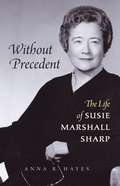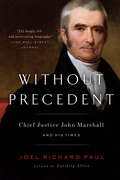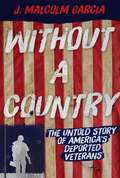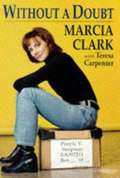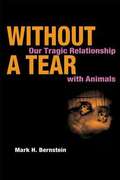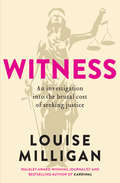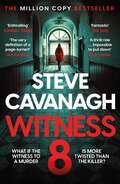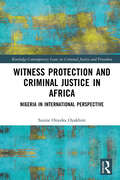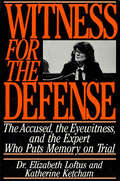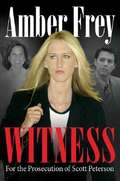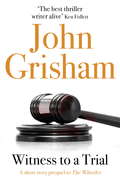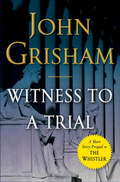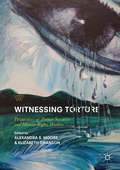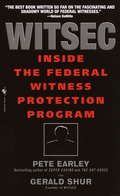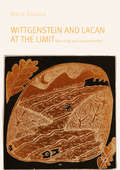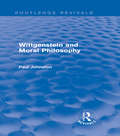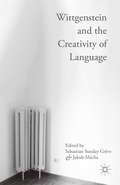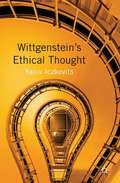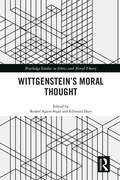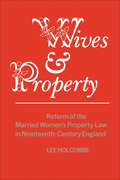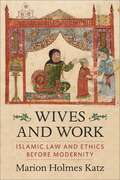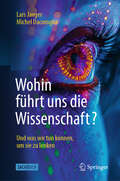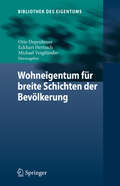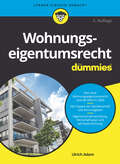- Table View
- List View
Without Offending Humans: A Critique of Animal Rights (Posthumanities #24)
by Élisabeth de FontenayA central thinker on the question of the animal in continental thought, Élisabeth de Fontenay moves in this volume from Jacques Derrida&’s uneasily intimate writing on animals to a passionate frontal engagement with political and ethical theory as it has been applied to animals—along with a stinging critique of the work of Peter Singer and Paola Cavalieri as well as with other &“utilitarian&” philosophers of animal–human relations.Humans and animals are different from one another. To conflate them is to be intellectually sentimental. And yet, from our position of dominance, do we not owe them more than we often acknowledge? In the searching first chapter on Derrida, she sets out &“three levels of deconstruction&” that are &“testimony to the radicalization and shift of that philosopher&’s argument: a strategy through the animal, exposition to an animal or to this animal, and compassion toward animals.&” For Fontenay, Derrida&’s writing is particularly far-reaching when it comes to thinking about animals, and she suggests many other possible philosophical resources including Adorno, Leibniz, and Merleau-Ponty.Fontenay is at her most compelling in describing philosophy&’s ongoing indifference to animal life—shading into savagery, underpinned by denial—and how attempts to exclude the animal from ethical systems have in fact demeaned humanity. But Fontenay&’s essays carry more than philosophical significance. Without Offending Humans reveals a careful and emotionally sensitive thinker who explores the unfolding of humans&’ assessments of their relationship to animals—and the consequences of these assessments for how we define ourselves.
Without Precedent
by Anna R. HayesThe first woman judge in the state of North Carolina and the first woman in the United States to be elected chief justice of a state supreme court, Susie Marshall Sharp (1907-1996) broke new ground for women in the legal profession. When she retired in 1979, she left a legacy burnished by her tireless pursuit of lucidity in the law, honesty in judges, and humane conditions in prisons.Anna Hayes presents Sharp's career as an attorney, distinguished judge, and politician within the context of the social mores, the legal profession, and the political battles of her day, illuminated by a careful and revealing examination of Sharp's family background, private life, and personality. Judge Sharp was viewed by contemporaries as the quintessential spinster, who had sacrificed marriage and family life for a successful career. The letters and journals she wrote throughout her life, however, reveal that Sharp led a rich private life in which her love affairs occupied a major place, unsuspected by the public or even her closest friends and family. With unrestricted access to Sharp's abundant journals, papers, and notes, Anna Hayes uncovers the story of a brilliant woman who transcended the limits of her times, who opened the way for women who followed her, and who improved the quality of justice for the citizens of her state. Without Precedent also tells the story of a complicated woman, at once deeply conservative and startlingly modern, whose intriguing self-contradictions reflect the complexity of human nature.
Without Precedent: Chief Justice John Marshall and His Times
by Joel Richard PaulThe remarkable story of John Marshall who, as chief justice, statesman, and diplomat, played a pivotal role in the founding of the United States.No member of America's Founding Generation had a greater impact on the Constitution and the Supreme Court than John Marshall, and no one did more to preserve the delicate unity of the fledgling United States. From the nation's founding in 1776 and for the next forty years, Marshall was at the center of every political battle. As Chief Justice of the United States - the longest-serving in history - he established the independence of the judiciary and the supremacy of the federal Constitution and courts. As the leading Federalist in Virginia, he rivaled his cousin Thomas Jefferson in influence. As a diplomat and secretary of state, he defended American sovereignty against France and Britain, counseled President John Adams, and supervised the construction of the city of Washington. D.C.This is the astonishing true story of how a rough-cut frontiersman - born in Virginia in 1755 and with little formal education - invented himself as one of the nation's preeminent lawyers and politicians who then reinvented the Constitution to forge a stronger nation. Without Precedent is the engrossing account of the life and times of this exceptional man, who with cunning, imagination, and grace shaped America's future as he held together the Supreme Court, the Constitution, and the country itself.
Without a Country: The Untold Story of America's Deported Veterans
by J. Malcolm GarciaMany Americans believe service in the military to be a quintessential way to demonstrate patriotism. We expect those who serve to be treated with respect and dignity. However, as in so many aspects of our politics, the reality and our ideals diverge widely in our treatment of veterans. There is perhaps no starker example of this than the continued practice of deporting men and women who have served.J. Malcolm Garcia has travelled across the country and abroad to interview veterans who have been deported, as well as the families and friends they have left behind, giving the full scope of the tragedy to be found in this all too common practice. Without a Country analyzes the political climate that has led us here and takes a hard look at the toll deportation has taken on American vets and their communities.Deported veterans share in and reflect the diversity of America itself. The numerous compounding injustices meted out to them reflect many of the still unresolved contradictions of our nation and its ideals. But this story, in all its grit and complexity, really boils down to an old, simple question: Who is a real American?
Without a Doubt
by Teresa Carpenter Marcia ClarkAs the prosecutor in the OJ Simpson trial, this book is about how Marcia Clark orchestrated the most controversial case of her career.
Without a Tear: OUR TRAGIC RELATIONSHIP WITH ANIMALS
by Mark H. BernsteinBeginning with our most cherished moral belief- that it is wrong to intentionally and gratuitously inflict harm upon the innocent- many of our most common practices involving animals stand in need of drastic revision. In Without a Tear Mark H. Bernstein begins with one of our most common and cherished moral beliefs: that it is wrong to intentionally and gratuitously inflict harm on the innocent. Over the course of the book, he shows how this apparently innocuous commitment requires that we drastically revise many of our most common practices involving nonhuman animals. Most people who write about our ethical obligations concerning animals base their arguments on emotional appeals or contentious philosophical assumptions. baggage. He considers the issues in a religious context, where he finds that Judaism in particular has the resources to ground moral obligations to animals. Without a Tear also makes novel use of feminist ethics to add to the case for drawing animals more closely into our ethical world. Bernstein details the realities of factory farms, animal-based research, and hunting fields, and contrasting these chilling facts with our moral imperatives clearly shows the need for fundamental changes to some of our most basic animal institutions. The tightly argued, provocative claims in Without a Tear will be an eye-opening experience for animal lovers, scholars, and people of good faith everywhere.
Witness
by Louise MilliganA masterful and deeply troubling exposé, Witness is the culmination of almost five years' work for award-winning investigative journalist Louise Milligan. Charting the experiences of those who have the courage to come forward and face their abusers in high-profile child abuse and sexual assault cases, Milligan was profoundly shocked by what she found. During this time, the #MeToo movement changed the zeitgeist, but time and again during her investigations Milligan watched how witnesses were treated in the courtroom and listened to them afterwards as they relived the associated trauma. Then she was a witness herself in the trial of the decade, R v George Pell.Through these experiences, interviews with high-profile members of the legal profession, including judges, prosecutors and the defence lawyers who have worked in these cases, along with never-before-published court transcripts, Milligan lays bare the flaws that are ignored and exposes a court system that is sexist, unfeeling and weighted towards the rich and powerful.In Witness, Milligan reveals the devastating reality that within the Australian legal system truth is never guaranteed and, for victims, justice is often elusive. And even when they get justice, the process is so bruising, they wish they had never tried.
Witness 8: The new Eddie Flynn thriller from the Top Five Sunday Times bestseller (Eddie Flynn)
by Steve CavanaghWHAT IF THE ONLY WITNESS TO A MURDER IS MORE TWISTED THAN THE KILLER?'The very definition of a page-turner!' IAN RANKIN'Steve Cavanagh's twists hit you between the eyes. You never see them coming' ANTHONY HOROWITZ'This guy is the real deal. Trust me' LEE CHILD'Steve Cavanagh writes the best hooks in the business' MICK HERRONRuby Johnson is a nanny and maid to wealthy families in Manhattan's West 74th Street. She knows their routines. Their secrets. One night, on her way home, Ruby witnesses a neighbour's murder. She knows the victim. She knows the killer. She makes an anonymous call to the police and names the murderer. But Ruby didn't tell the truth...Because there's something wrong with Ruby Johnson. Eddie Flynn, conman turned trial lawyer, must defend an innocent man accused of this terrible crime. As Ruby's deadly game begins, one thing is certain.It won't be the last murder this witness is involved in...'A fantastic thriller writer' MARK BILLINGHAM'A masterclass in thriller writing. Absolutely superb' M. W. CRAVENThe award-winning, Sunday Times Top Five bestseller returns with a brand new thriller featuring the unforgettable Eddie Flynn.* Kill For Me Kill For You was number five in Sunday Times hardback fiction chart on 6th August 2023.Praise for Steve Cavanagh:'Unputdownable' ALEX MICHAELIDES'An absolute page turner' SHARI LAPENA'Will keep you guessing until the very end' IAN RANKIN'The ultimate treat for crime fiction fans' JANICE HALLETT'Books this ingenious don't come along very often' MICHAEL CONNELLY'An absolute humdinger of a thriller - fiendishly clever and totally compelling.' TM LOGAN'Gripping' THE SUN'If you read the first eight pages you'll be hooked' THE TIMES'The real magic is in Steve Cavanagh's hypnotic storytelling power' SUNDAY EXPRESS'Cavanagh is a genius... page-turning stuff' EVENING STANDARD'A masterclass in misdirection' THE GUARDIAN
Witness Protection and Criminal Justice in Africa: Nigeria in International Perspective (Routledge Contemporary Issues in Criminal Justice and Procedure)
by Suzzie Onyeka OyakhireThis book examines the concept of witness protection which is still at an early developmental stage in several African countries including Nigeria, from a legal and institutional perspective. Recent developments in Nigeria highlight the need to clarify legal and conceptual issues within the existing legal framework for protecting witnesses. Using the Nigerian case study, the book illustrates some obscurities inherent in the concept of witness protection. These are highlighted around five critical areas: the definition of witness protection; the scope of beneficiaries requiring protection; the nature of crimes necessitating protection; the nature of protective measures; and the administrative control of witness protection. Specifically, this book draws from the existing literature and practices of witness protection and adopts two distinct perspectives: the criminal justice perspectives and human rights perspectives as heuristic tools for analysing the concept and to separate the disparate influences that shape how it is construed. These distinctions are utilised throughout the book as an integrated way of conceptualising the concept of witness protection. By discussing the practice of witness protection within the Nigerian context, the book contributes to African conversations on the topic of witness protection. The clarifications made in this book are utilised in making normative proposals for developing a legal framework for witness protection in Nigeria. They are also useful for other African countries interested in developing a witness protection framework as part of criminal justice reform. This book will serve as a reference point for legal scholars, researchers, academics, (postgraduate) students and policy makers interested in the concept of witness protection. It would also be useful for courses ‘concerned with comparative criminology where there is an interest in developments in the Global South.’
Witness for the Defense: The Accused, the Eyewitness, and the Expert Who Puts Memory on Trial
by Katherine Ketcham Elizabeth Loftus"The study of memory had become my specialty, my passion. In the next few years I wrote dozens of papers about how memory works and how it fails, but unlike most researchers studying memory, my work kept reaching out into the real world. To what extent, I wondered, could a person's memory be shaped by suggestion? When people witness a serious automobile accident, how accurate is their recollection of the facts? If a witness is questioned by a police officer, will the manner of questioning alter the representation of the memory? Can memories be supplemented with additional, false information?"The "passion" Loftus describes in the lines above led her to a teaching career at the University of Washington and, perhaps more importantly, into hundreds of courtrooms as an expert witness on the fallibility of eyewitness accounts. As she has explained in numerous trials, and as she convincingly argues in this absorbing book, eyewitness accounts can be and often are so distorted that they no longer resemble the truth.
Witness for the Prosecution of Scott Peterson
by Amber FreyWitness is the chilling story of how a young woman became ensnared in Scott Peterson's web of lies, then risked everything to seek justice for Laci Peterson and her unborn child, Conner. It is also a story of forgiveness and faith, and of one woman's struggle to live with an open and honest heart.
Witness to a Trial: A Short Story Prequel to The Whistler
by John GrishamA startling and original courtroom drama and short story prequel to THE WHISTLER, from master of the legal thriller John Grisham.A judge's first murder trial.A defense attorney in over his head.A prosecutor out for blood and glory.The accused, who is possibly innocent.And the killer, who may have just committed the perfect crime. 350+ million copies, 45 languages, 9 blockbuster films:NO ONE WRITES DRAMA LIKE JOHN GRISHAM
Witness to a Trial: A Short Story Prequel to The Whistler
by John GrishamA startling and original courtroom drama from New York Times #1 Best Seller John Grisham that is the prequel to his newest legal thriller, The Whistler. An Original E-Short. A judge&’s first murder trial.A defense attorney in over his head.A prosecutor out for blood and glory.The accused, who is possibly innocent.And the killer, who may have just committed the perfect crime.Don&’t miss John Grisham&’s new book, THE EXCHANGE: AFTER THE FIRM!
Witnessing Torture: Perspectives of Torture Survivors and Human Rights Workers (Palgrave Studies in Life Writing)
by Elizabeth Swanson Alexandra S. MooreThis book demonstrates a new, interdisciplinary approach to life writing about torture that situates torture firmly within its socio-political context, as opposed to extending the long line of representations written in the idiom of the proverbial dark chamber. By dismantling the rhetorical divide that typically separates survivors’ suffering from human rights workers’ expertise, contributors engage with the personal, professional, and institutional dimensions of torture and redress. Essays in this volume consider torture from diverse locations – the Philippines, Argentina, Sudan, and Guantánamo, among others. From across the globe, contributors witness both individual pain and institutional complicity; the challenges of building communities of healing across linguistic and national divides; and the role of the law, art, writing, and teaching in representing and responding to torture.
Witsec: Inside the Federal Witness Protection Program
by Pete EarleyFor decades no law enforcement program has been as cloaked in controversy and mystery as the Federal Witness Protection Program. Now, for the first time, Gerald Shur, the man credited with the creation of WITSEC, teams with acclaimed investigative journalist Pete Earley to tell the inside story of turncoats, crime-fighters, killers, and ordinary human beings caught up in a life-and-death game of deception in the name of justice. When the government was losing the war on organized crime in the early 1960s, Gerald Shur, a young attorney in the Justice Department's Organized Crime and Racketeering Section, urged the department to entice mobsters into breaking their code of silence with promises of protection and relocation. But as high-ranking mob figures came into the program, Shur discovered that keeping his witnesses alive in the face of death threats involved more than eradicating old identities and creating new ones. It also meant cutting off families from their pasts and giving new identities to wives and children, as well as to mob girlfriends and mistresses. It meant getting late-night phone calls from protected witnesses unable to cope with their new lives. It meant arranging funerals, providing financial support, and in one instance even helping a mobster's wife get breast implants. And all too often it meant odds that a protected witness would return to what he knew best-crime.In this book Shur gives a you-are-there account of infamous witnesses, from Joseph Valachi to "Sammy the Bull" Gravano to "Fat Vinnie" Teresa, of the lengths the program goes to to keep its charges safe, and of cases that went very wrong and occasionally even protected those who went on to kill again. He describes the agony endured by innocent people who found themselves in the wrong place at the wrong time and ended up in a program tailored to criminals. And along with Shur's war stories, WITSEC draws on the haunting words of one mob wife, who vividly describes her life of lies, secrecy, and loss inside the program. A powerful true story of the inner workings of one of the most effective and controversial weapons in the war against organized crime and the inner workings of organized crime itself-and more recently against Colombian drug dealers, outlaw motorcycle gang members, white-collar con men, and international terrorists--this book takes us into a tense, dangerous twilight world carefully hidden in plain sight: where the family living next door might not be who they say they are.
Wittgenstein and Lacan at the Limit: Meaning and Astonishment
by Maria BalaskaThis book brings together the work of Ludwig Wittgenstein and Jacques Lacan around their treatments of ‘astonishment,’ an experience of being struck by something that appears to be extraordinarily significant. Both thinkers have a central interest in the dissatisfaction with meaning that these experiences generate when we attempt to articulate them, to bring language to bear on them. Maria Balaska argues that this frustration and difficulty with meaning reveals a more fundamental characteristic of our sense-making capacities –namely, their groundlessness. Instead of disappointment with language’s sense-making capacities, Balaska argues that Wittgenstein and Lacan can help us find in this revelation of meaning’s groundlessness an opportunity to acknowledge our own involvement in meaning, to creatively participate in it and thereby to enrich our forms of life with language.
Wittgenstein and Moral Philosophy: Ethics After Wittgenstein (Routledge Revivals #Vol. 1)
by Paul JohnstonWittgenstein’s philosophical achievement lies in the development of a new philosophical method rather than in the elaboration of a particular philosophical system. Dr Paul Johnston applies this innovative method to the central problems of moral philosophy: whether there can be ‘truth’ in ethics, or what the meaning of objectivity might mean in the context of moral deliberation. Wittgenstein and Moral Philosophy, first published in 1989, represents the first serious and rigorous attempt to apply Wittgenstein’s method to ethics. The conclusions arrived at differ radically from those dominating contemporary ethical discussion, revealing an immense discrepancy between the ethical concepts employed in everyday moral decision-making and the way in which these are discussed by philosophers. Dr Johnston examines ways of eliminating this discrepancy in order to gain a clearer picture of the proper nature of moral claims, and at the same time provides new insights into Wittgenstein’s conception of philosophy.
Wittgenstein and the Creativity of Language
by Jakub Mácha Sebastian Sunday GrèveThis volume is the first to focus on a particular complex of questions that have troubled Wittgenstein scholarship since its very beginnings. The authors re-examine Wittgenstein’s fundamental insights into the workings of human linguistic behaviour, its creative extensions and its philosophical capabilities, as well as his creative use of language. It offers insight into a variety of topics including painting, politics, literature, poetry, literary theory, mathematics, philosophy of language, aesthetics and philosophical methodology.
Wittgenstein’s Ethical Thought
by Yaniv IczkovitsExploring the ethical dimension of Wittgenstein's thought, Iczkovits challenges the view that Wittgenstein had a vision of language and subsequently a vision of ethics, showing how the two are integrated in his philosophical method, and allowing us to reframe traditional problems in moral philosophy considered as external to questions of meaning.
Wittgenstein’s Moral Thought (Routledge Studies in Ethics and Moral Theory)
by Reshef Agam-Segal Edmund DainWittgenstein’s work, early and later, contains the seeds of an original and important rethinking of moral or ethical thought that has, so far, yet to be fully appreciated. The ten essays in this collection, all specially commissioned for this volume, are united in the claim that Wittgenstein’s thought has much to contribute to our understanding of this fundamental area of philosophy and of our lives. They take up a variety of different perspectives on this aspect of Wittgenstein’s work, and explore the significance of Wittgenstein’s moral thought throughout his work, from the Tractatus Logico-Philosophicus, and Wittgenstein’s startling claim there that there can be no ethical propositions, to the Philosophical Investigations.
Wives & Property: Reform of the Married Women's Property Law in Nineteenth-Century England
by Lee HolcombeIn the 1870s Millicent Garrett Fawcett had her purse snatched by a young thief in London. When he appeared in court to testify, she heard the young man charged with 'stealing from the person of Millicent Fawcett a purse containing £1 18s 6d the property of Henry Fawcett.' Long after the episode she recalled: 'I felt as if I had been charged with theft myself.' The English common law which deprived married women of the right to own and control property had far-reaching consequences for the status of women not only in other areas of law and in family life but also in education, and employment, and public life. To win reform of the married women's property law, feminism as an organized movement appeared in the 1850s, and the final success of the campaigns for reform in 1882 was one of the greatest achievements of the Victorian women's movement. Dr Holcombe explores the story of the reform campaign in the context of its time, giving particular attention to the many important men and women who worked for reform and to the debates on the subject which contributed greatly to the formulation of a philosophy of feminism.
Wives and Work: Islamic Law and Ethics Before Modernity
by Marion Holmes KatzIt is widely held today that classical Islamic law frees wives from any obligation to do housework. Wives’ purported exemption from domestic labor became a talking point among Muslims responding to Orientalist stereotypes of the “oppressed Muslim woman” by the late nineteenth century, and it has been a prominent motif in writings by Muslim feminists in the United States since the 1980s.In Wives and Work, Marion Holmes Katz offers a new account of debates on wives’ domestic labor that recasts the historical relationship between Islamic law and ethics. She reconstructs a complex discussion among Sunni legal scholars of the ninth to fourteenth centuries CE and examines its wide-ranging implications. As early as the ninth century, the prevalent doctrine that wives had no legal duty to do housework stood in conflict with what most scholars understood to be morally and religiously right. Scholars’ efforts to resolve this tension ranged widely, from drawing a clear distinction between legal claims and ethical ideals to seeking a synthesis of the two. Katz positions legal discussion within a larger landscape of Islamic normative discourse, emphasizing how legal models diverge from, but can sometimes be informed by, philosophical ethics. Through the lens of wives’ domestic labor, this book sheds new light on notions of family, labor, and gendered personhood as well as the interplay between legal and ethical doctrines in Islamic thought.
Wohin führt uns die Wissenschaft?: Und was wir tun können, um sie zu lenken
by Lars Jaeger Michel DacorognaIn den letzten 60 Jahren hat sich die Welt radikal gewandelt, angetrieben von bahnbrechenden Fortschritten in Wissenschaft und Technologie. Von den 1960ern bis heute erlebten wir einen beispiellosen Anstieg unseres Wissens in Bereichen wie Physik, Chemie, Biologie, Medizin, Computerwissenschaften und virtuelle Realitäten. Dies führte zur Entwicklung von wegweisenden Technologien wie Personalcomputern, dem Internet, Multitasking-Handys und fortschrittlicher künstlicher Intelligenz. Die Wissenschaft wurde dezentralisiert, und globale Forschergruppen arbeiten an komplexen Problemen, die unser Leben exponentiell beeinflussen. Unsere Welt verändert sich nicht mehr durch Einzeltechnologien, sondern durch die gleichzeitige Entwicklung verschiedener Technologien innerhalb weniger Jahre. Trotz des Wohlstands brachten Wissenschaft und Technologie auch neue globale Risiken mit sich. Atomkraft für das Militär, aufkommende künstliche Intelligenz, genetische Veränderungen und die Kontrolle durch Technologieunternehmen sind Herausforderungen, die unsere Zukunft prägen. Insgesamt hat der Fortschritt der letzten 60 Jahre unsere Welt transformiert und uns vor Chancen und Herausforderungen gestellt, die eine sorgfältige und ethische Gestaltung unserer Zukunft erfordern.
Wohneigentum für breite Schichten der Bevölkerung (Bibliothek des Eigentums #18)
by Otto Depenheuer Michael Voigtländer Eckhart HertzschIn der wohnungspolitischen Debatte steht meist der Mietwohnungsmarkt im Vordergrund, dabei bietet das Wohneigentum gerade auch für Haushalte mit geringeren Einkommen vielfältige Möglichkeiten. Sei es die Vermeidung jahrelanger Mietzahlungen, die Stabilität gleichbleibender Kreditzahlungen, die Sicherheit, dass niemand Eigenbedarf anmelden kann, oder die Vorsorge für das Alter; all dies sind Beweggründe hin zum Eigentum. Kosten und Vermögensbildung wie auch länderspezifische und bundespolitische Instrumente, werden – neben vielen anderen Aspekten – in diesem Buch von namhaften Autorinnen und Autoren diskutiert. Beispiele erfolgsversprechender Lösungen werden aufgezeigt, die den Zugang zu Wohneigentum für breite Schichten der Bevölkerung erleichtern sollen.
Wohnungseigentumsrecht für Dummies (Für Dummies)
by Ulrich AdamWenn Sie bereits Wohnungseigentum besitzen oder darüber nachdenken, sich welches zuzulegen, dann sollten Sie über Ihre Rechte und Pflichten möglichst gut Bescheid wissen. Wohnungseigentumsrecht ist nicht schwierig. Der spezialisierte Rechtsanwalt und Fachanwalt Dr. Ulrich Adam erklärt Ihnen in diesem Buch Schritt für Schritt mit vielen Übersichten und Beispielen alles, was Sie darüber wissen sollten. Die umfassenden Änderungen der Reform 2020 sind in der 2. Auflage bereits vollständig in den Text eingearbeitet. Zahlreiche Abbildungen, Checklisten und Beschlussvorlagen erleichtern Ihnen Ihr Leben als Wohnungseigentümer. Erfahren Sie alles über Verwaltung, bauliche Änderungen, Eigentümerversammlung, Beschlussanfechtung, Jahresabrechnung und vieles andere mehr - und das immer einfach lesbar, verständlich und humorvoll. Damit sind Sie als Wohnungseigentümer für die nächste Eigentümerversammlung bestens ausgestattet!

